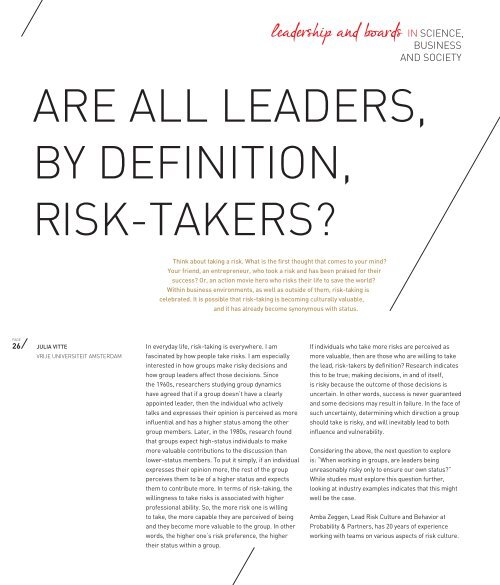Executives in Science, Business and Society 3
Create successful ePaper yourself
Turn your PDF publications into a flip-book with our unique Google optimized e-Paper software.
leadership <strong>and</strong> boards IN SCIENCE,<br />
BUSINESS<br />
AND SOCIETY<br />
ARE ALL LEADERS,<br />
BY DEFINITION,<br />
RISK-TAKERS?<br />
Th<strong>in</strong>k about tak<strong>in</strong>g a risk. What is the first thought that comes to your m<strong>in</strong>d?<br />
Your friend, an entrepreneur, who took a risk <strong>and</strong> has been praised for their<br />
success? Or, an action movie hero who risks their life to save the world?<br />
With<strong>in</strong> bus<strong>in</strong>ess environments, as well as outside of them, risk-tak<strong>in</strong>g is<br />
celebrated. It is possible that risk-tak<strong>in</strong>g is becom<strong>in</strong>g culturally valuable,<br />
<strong>and</strong> it has already become synonymous with status.<br />
PAGE<br />
26 JULIA VITTE<br />
In everyday life, risk-tak<strong>in</strong>g is everywhere. I am<br />
VRIJE UNIVERSITEIT AMSTERDAM fasc<strong>in</strong>ated by how people take risks. I am especially<br />
<strong>in</strong>terested <strong>in</strong> how groups make risky decisions <strong>and</strong><br />
how group leaders affect those decisions. S<strong>in</strong>ce<br />
the 1960s, researchers study<strong>in</strong>g group dynamics<br />
have agreed that if a group doesn’t have a clearly<br />
appo<strong>in</strong>ted leader, then the <strong>in</strong>dividual who actively<br />
talks <strong>and</strong> expresses their op<strong>in</strong>ion is perceived as more<br />
<strong>in</strong>fluential <strong>and</strong> has a higher status among the other<br />
group members. Later, <strong>in</strong> the 1980s, research found<br />
that groups expect high-status <strong>in</strong>dividuals to make<br />
more valuable contributions to the discussion than<br />
lower-status members. To put it simply, if an <strong>in</strong>dividual<br />
expresses their op<strong>in</strong>ion more, the rest of the group<br />
perceives them to be of a higher status <strong>and</strong> expects<br />
them to contribute more. In terms of risk-tak<strong>in</strong>g, the<br />
will<strong>in</strong>gness to take risks is associated with higher<br />
professional ability. So, the more risk one is will<strong>in</strong>g<br />
to take, the more capable they are perceived of be<strong>in</strong>g<br />
<strong>and</strong> they become more valuable to the group. In other<br />
words, the higher one’s risk preference, the higher<br />
their status with<strong>in</strong> a group.<br />
If <strong>in</strong>dividuals who take more risks are perceived as<br />
more valuable, then are those who are will<strong>in</strong>g to take<br />
the lead, risk-takers by def<strong>in</strong>ition? Research <strong>in</strong>dicates<br />
this to be true; mak<strong>in</strong>g decisions, <strong>in</strong> <strong>and</strong> of itself,<br />
is risky because the outcome of those decisions is<br />
uncerta<strong>in</strong>. In other words, success is never guaranteed<br />
<strong>and</strong> some decisions may result <strong>in</strong> failure. In the face of<br />
such uncerta<strong>in</strong>ty, determ<strong>in</strong><strong>in</strong>g which direction a group<br />
should take is risky, <strong>and</strong> will <strong>in</strong>evitably lead to both<br />
<strong>in</strong>fluence <strong>and</strong> vulnerability.<br />
Consider<strong>in</strong>g the above, the next question to explore<br />
is: “When work<strong>in</strong>g <strong>in</strong> groups, are leaders be<strong>in</strong>g<br />
unreasonably risky only to ensure our own status?”<br />
While studies must explore this question further,<br />
look<strong>in</strong>g at <strong>in</strong>dustry examples <strong>in</strong>dicates that this might<br />
well be the case.<br />
Amba Zeggen, Lead Risk Culture <strong>and</strong> Behavior at<br />
Probability & Partners, has 20 years of experience<br />
work<strong>in</strong>g with teams on various aspects of risk culture.

















